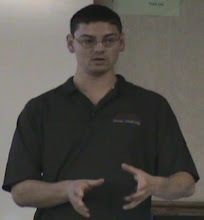I came across this article: Quantum computers are coming- just don't ask when. I'm no expert on physical implementations of quantum computers, but I thought it gave a good overview of some of the current physical implementations and challenges. The optimistic view of overcoming the challenges for building and quantum computers is right on target in my opinion.
I also thought that the end of the article was particularly noteworthy: it mentions that the first quantum computers may be devices that are originally used as subsystems of classical computers. This is Knill's QRAM model as I've previously written about. It is good to see that the software and hardware worlds of quantum computing are thinking along the same lines for initial implementations. There is a lot of work still to be done, but we're making good progress.
Tuesday, September 29, 2009
Thursday, September 17, 2009
Cove Dissertation Finished

I've finished my doctoral dissertation at Colorado Technical University, titled "Cove: A Practical Quantum Computer Programming Framework". I'll be pushing it elsewhere onto the net later on, but for now you can down load it from my Cove site here.
Here's the abstract:
While not yet in commercial existence, quantum computers have the ability to solve certain classes of problems that are not efficiently solvable on existing Turing Machine based (classical) computers. For quantum computers to be of use, methods of programming them must exist. Proposals exist for programming quantum computers, but all of the existing ones suffer from flaws that make them impractical in commercial software development environments. Cove is a framework for programming quantum computers that extends existing classical languages to allow for quantum computation, thus providing a quantum computing toolkit for commercial software developers. Since the target users of Cove are commercial developers, it is an object oriented framework that can be used by multiple languages and also places emphasis on complete documentation. The focus of Cove is not so much on the software product, but on the fundamental concepts that make quantum computing practical for common developers.
While a little lengthy, it has a lot of good background information in chapter 2 for quantum computing novices. The circuit diagrams for building up Shor's algorithm in chapter 4 and the complete list of quantum operations should also be interest to some- not to mention the framework itself.
Thursday, September 10, 2009
Chip Scale Quantum Computer

I'd like to thank one of my dissertation readers, Dr. Thompson, for sending this my way: Quantum Chip Helps Crack Code. In a nutshell researchers at the University of Bristol did the part of factoring (finding the period) that needs a quantum computer on a chip sized device that is optical based.
They only did the period finding for factoring 15, which in itself doesn't sound too impressive- but this is on an actual quantum computer. Furthermore this is on a chip sized device, there isn't a need for a whole lab full of equipment to carry this out. Pretty impressive. I don't know if the approach is scalable, but perhaps it points towards our initial quantum computers being too large in size.
This together with NIST's work I wrote about recently has made this a pretty exciting past few months towards realizing commercial quantum computers.
Thursday, September 3, 2009
How will Quantum Computers Apply to Space Travel?

I've always been a big fan of space related things: I nearly wore out my VHS of Carl Sagan's Cosmos as kid and staying up to watch Voyager 2's flyby of Neptune was a highlight of the summer of 1989. (The image is a NASA image of Voyager.)
I've already brought up William Halal's work [1] in a few other posts. In it a Moon base is predicted around 2028 and Men on Mars shortly after, around 2030. Both of these estimates are with slightly more than 50% confidence. At first impression that sounds too soon to me, but then I think about how quickly we put men on the Moon- and with 1960's technology to boot. So after second thought it sounds reasonable. (I also recommend checking out Dr. Zubrin's Mars Society and work on Mars Direct, especially for those who don't think it is possible.)
So of course my mind started wondering, how will quantum computers play a role in space travel? The one area that jumps to the front of my mind is the simulation of quantum systems. A simulation could be used to investigate the potential of different propulsion schemes for example. Any simulation of a quantum system experiences an exponential slow down in the worse case on a classical (existing non-quantum) computer. So with a quantum computer you can do the sorts of simulations you wouldn't be able to do even if you had every classical computer in the world at your disposal. Who knows, maybe in Star Trek they're actually predicting problems with the warp core with a quantum computer? :)
I'm not saying that we need quantum computers for space travel. I see quantum computers as a specialized resource, as I mentioned in my More Thoughts on Quantum Computers Becoming a Reality post a few weeks ago. What I am saying is that maybe they will help us tackle some of these hard problems to make longer distance space travel a reality more quickly and/or perhaps more safe.
For more on Mars Direct, also check out one of Dr. Zubrin's latest speeches:
References
[1] W. E. Halal, Technology's Promise: Expert Knowledge on the Transformation of Business and Society, 1 ed. New York, NY: Palgrave Macmillan, 2008.
Subscribe to:
Comments (Atom)
